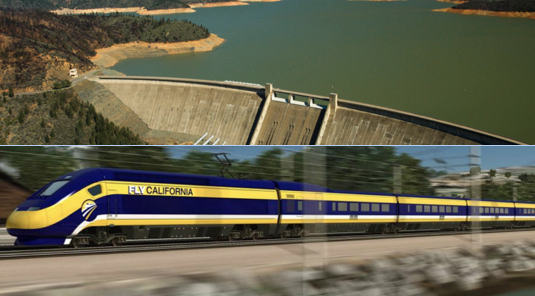The high-speed rail project has avoided roadblocks from lawsuits (so far), negative media reports and legislative efforts calling for a new vote of the people – but can it withstand a new initiative proposal that calls for moving unspent high-speed rail bond money from the rail undertaking to build surface water and groundwater storage projects?
An initiative filed yesterday by Board of Equalization member George Runner and State Senator Bob Huff would add an amendment to the California Constitution to make a priority of irrigation and drinking water. To pay for new water storage facilities without raising taxes or adding new debt the initiative proposes using $8 billion of the unspent portion of the nearly $10 billion rail bond approved by voters in 2008. In addition, the proposed measure calls for moving $2.7 billion of the water bond passed in 2012 for specified water storage purposes.
The proposed initiative starts from a place of strength considering public perceptions. Voters have acknowledged concerns over water because of the drought. Polls also show voters have soured over the high-speed-rail since the bond passed in 2008 with 52.7% of the vote.
Voters have turned on the rail project because of many doubts raised that the high-speed rail will not live up to promises made at the time the bond passed. Proponents of the water storage act made sure to list those concerns in the text of the measure including doubling the project’s costs voters were told in 2008, slower speeds and longer travel times among others.
If the initiative qualifies for the ballot, the campaign could be run on two fronts: One–pro-water storage; the other anti-rail. In a roundabout way, this measure would give the voters a chance to vote on the high speed rail project again – an opportunity denied them when efforts to pass legislation calling for a re-confirming vote on the rail project failed in the legislature.
Another victim of this measure could be a proposed water bond initiative authored by former state conservation official, Jerry Meral. He filed a number of initiative proposals with the Attorney General claiming the 2014 water bond passed by voters was insufficient to meet the water crisis in the state. A water storage bond using money voters already approved could have an advantage over a new water bond that would require an additional debt burden on the general fund.
But, it will be the high-speed rail that will capture attention if this measure qualifies for the ballot. The media and public will focus on the proposition as a test of voter support for the bullet train.


